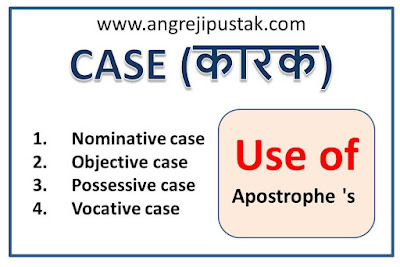There are only three cases in modern English, they are subjective (he), objective (him) and possessive (his).
They may seem more familiar in their old English form - nominative, accusative and genitive.
There is no dative case in modern English. Yippee!
First more good news.
First more good news.
There are a few remnants of old English though, and pronouns have distinctive forms in all three cases and should be used with a bit more care.
The pronoun cases are simple though. There are only three:-
1. Subjective case(कर्ता कारक): pronouns used as subject.
2. Objective case(कर्म कारक): pronouns used as objects of verbs or prepositions.
3. Possessive case(अधिकार कारक): pronouns which express ownership.
PERSONAL PRONOUN
Subjective/Nominative-Referring to the subject in a sentence
I -मैं
The pronoun cases are simple though. There are only three:-
1. Subjective case(कर्ता कारक): pronouns used as subject.
2. Objective case(कर्म कारक): pronouns used as objects of verbs or prepositions.
3. Possessive case(अधिकार कारक): pronouns which express ownership.
PERSONAL PRONOUN
Subjective/Nominative-Referring to the subject in a sentence
I -मैं
You तुम
He- वह(पुरुष)
She - वह(स्त्री)
It - यह(नपुंसक/उभय)
We - हम
They - वे
Who - जो(व्यक्ति)
Sub and possessive example
I talk to my brother
I talk to your brother
I talk to her brother
I talk to our principal
I talk to his parents
You call to my sister.
You call to your sister
You call to our guardians
You call to their parents
You call to her teacher
They ask your brother
They ask their plumber.
They ask my parents
Objective/Accusative-Referring to the object in a sentence
Me - मुझे
You- तुम्हें
You- तुम्हें
Him- उसे(पुरुष)
Her - उसे(स्त्री)
It - इसे(नपुंसक/उभय)
Us -हमें
Them - उन्हें
Whom-जिन्हें
Sub and objects example
You teach me
You teach her
You teach us
You teach them
I tell you
I tell them
I tell her
I tell Ram
I close it.
They interfere us
They interfere them
They interfere me
Possessive/Genitive-The apostrophe form of the word ("Lynne's).
Mine-/my - मेरा
Yours/your- तुम्हारा
His- उसका(पुरुष)
Her/hers-उसका(स्त्री)
Its-इसका(उभय/नपुंसक)
Our/ours-हमारा
Their/theirs-उनका
Whose- जिसका(व्यक्ति)
These pronouns, and who and its compounds, are the only words that are inflected in all three cases (subjective, objective, possessive).
His- उसका(पुरुष)
Her/hers-उसका(स्त्री)
Its-इसका(उभय/नपुंसक)
Our/ours-हमारा
Their/theirs-उनका
Whose- जिसका(व्यक्ति)
These pronouns, and who and its compounds, are the only words that are inflected in all three cases (subjective, objective, possessive).
In nouns the first two cases (subjective and objective) are indistinguishable, and are called the common case.
One result of this simplicity is that, the sense of case being almost lost, the few mistakes that can be made are made often, even by native speakers, some of them so often that they are now almost right by prescription.
The Subjective Case(कर्ता कारक)
It is in the subjective case whenever a pronoun is the subject of a clause or sentence. As a result, I, you, he, she, it, we, they, and who are subjective case pronouns.
The Subjective Case(कर्ता कारक)
It is in the subjective case whenever a pronoun is the subject of a clause or sentence. As a result, I, you, he, she, it, we, they, and who are subjective case pronouns.
Like:
He goes to market dialy for his job.
It is banal talk.
You have done all home work correctly.
You have done all home work correctly.
The Objective Case(कर्म कारक)
The following pronouns are in the objective case. These act as objects of verbs or prepositions: me, you, him, her, it, us, them, and whom.
The following pronouns are in the objective case. These act as objects of verbs or prepositions: me, you, him, her, it, us, them, and whom.
Like
He works with me.
They play here with us
Do you know him?
The Possessive Case(स्वामित्व कारक)
Possession is commonly indicated using the apostrophe along with the alphabet S with nouns (or just the apostrophe, in the case of most plural nouns). Possession is demonstrated by pronouns utilising possessive case forms.
Possession is commonly indicated using the apostrophe along with the alphabet S with nouns (or just the apostrophe, in the case of most plural nouns). Possession is demonstrated by pronouns utilising possessive case forms.
Like:
He works with his brother.
They play here with our classmates
Do you know their family members?
Possessive Pronouns has two types
1- Absolute possessive pronouns-(पूर्ण स्वामित्व सर्वनाम)
(mine, yours, his, hers, ours, and theirs )
2- Possessive determiners (स्वामित्व निर्धारक)
(my, your, his, her, its, our, their, whose )
Practice
Find at least a (subjective, objective and possessive) case
Sub, object and possessive example mixed
मैंने तुम्हें और अपने भाई को एक कठिन प्रश्न पूछा।
- I asked a typical question to you and my brother.
Try the same.
- I and you respect our nation b'coz it pleasurs us.
- I already have taken your book I'll return it to you.
- I know her father's name I went temple with her.
- I aked all tough quesions to his brother, I used to go tumtion to him.
- I have never seen this garden before and its outerpart but my father explained about it.
हमें अपने आप/खुद पर भरोषा है तभी तो हम अपनी परीक्षा अच्छे से दे रहे हैं।
- We have believe in us ourselves so that we are giving our exams well.
Try to same .
- We
- We
- We
- We
तुम मुझे तंग कर रहे हो लेकिन मेने तुम्हारी कापी नहीं देखी।
- You are irritating me but I didn't see your copy.
Try the same
- You
- You
- You
- You
वे मेरे साथ कम कर रहे हैं और मेरे दोस्तो भी।
- They are working with me as well as my friends.
Try the same
- They
- They
- They
- They
वह मुझे सबसे मुश्किल प्रश्न पूछ रहा है जबकि मेरे सहपाठियों को आसान।
- He is asking me all toughest questions but easy to my classmates.
Try the same
- He
- He
- He
- He
वह मुझ पर चिला रही है जबकि उसकी माँ अक्सर मेरे ममी से सलाह लेती रहती है।
- She is shouting on me but her mom used to consult my mom.
Try the same
- She
- She
- She
- She
यह मेरे सपनों की कार है क्यूंकी यह मुझ पर जमती है।
- It is my dreaming car because it deserves me.
Try the same
- It
- It
- It
- It
राम गर्मियों में मेरे गाँव गया और मेरे और उसके लिए यह आनंदमय लम्हा था ।
- Ram went my village in summer and it was ecstatic moment to me as well as him.
Try the same
- Ram
- Ram
- Ram
Practice Question
Q.1 They have been playing for a long time.-
- objective case
- Subjective case
- possessive case
Subjective case
Q.2That new bag is hers.-
- possessive case
- Subjective case
- objective case
possessive case
Q.3 Every one told them that they sing very well.
- Subjective case
- possessive case
- objective case
Subjective case
Q.4 Have you bought this T shirt for me.
- Subjective case
- objective case
- possessive case
objective case
Q.5 Every one told them that they sing very well.
- Subjective case
- objective case
- possessive case
objective case
Q.6 He have been singing for a long time.
- Subjective case
- objective case
- Nominative case
Nominative case
Q.7 Everyone told them that she dances very well.-
- Nominative case
- objective case
- Subjective case
Nominative case
Q.8 Have you bought this phone for her.-
- Nominative case
- objective case
- Accusative
Accusative
Q.9 This room is mine.-
- Nominative case
- Genitive case
- Accusative
Genitive case
Q.10 Everyone told her that he has done his work.-
- Objective case
- Genitive case
- Accusative
Accusative
Q.11 possessive case is also known as-
- Nominative case
- Genitive case
- Accusative
Genitive case
Q.12 Nominative case is -
- Objective case
- Subjective case
- Possessive case
Subjective case
Q.13 The personal pronoun used as subject will be -
- Objective case
- Nominative case
- Possessive case
Nominative case
Q.14 In english, there are mainly ____ type of cases -
- 3
- 4
- 2
4
Q.15 She is a singer here singer is -
- Nomiantive or subjective case
- objective case
- The vocative case
Nominative or subjective case.(is a noun and complement to the subject)
Q.16 This is Swati'S phone, here "Swati'S" is-
- Nomiantive or subjective case
- possessive or genitive case
- The vocative case
possessive or genitive case.
Q.16 I supported team CSK in IPL 2020, Here 'team CSK' is -
- Nomiantive or subjective case
- possessive or genitive case
- Objective or Accusative case
Objective or Accusative case.
Q.17 Meera is coming with her aunt. here "her" is -
- Nomiantive or subjective case
- possessive or genitive case
- Objective or Accusative case
possessive or genitive case.
Q.18 You, come here, Here "you" is -
- Nomiantive or subjective case
- possessive or genitive case
- The vocative case
The vocative case.
Q.19 When a noun is written in possessive case, it shows -
- Ownership or close relationship
- Membership in a group of Subject
- Ownership of the indirect object
Ownership or close relationship.
Q.20 Suzan, think about it again. 'here suzan is' -
- Nominative case
- Vocative case
- Accusative case
Vocative case.







0 Comments